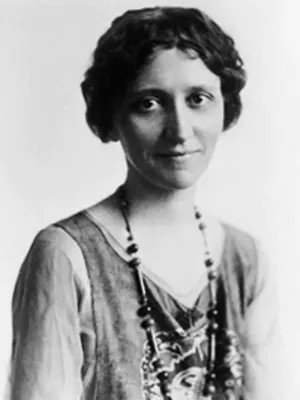
Governor Albert H. Roberts (1868 – 1946)
Albert Houston Roberts (Image source, Tennessee State Library and Archives) from Overton County was an educator, jurist, and politician. He served as Governor of Tennessee from 1919 to 1921 and was instrumental in obtaining state ratification of the Nineteenth Amendment for woman suffrage. His highly unpopular tax reform, his use of state troops against labor, and his support for women’s rights combined to make him one of the most unpopular Democratic governors in the state’s history. He lost a reelection bid in 1920 to Alfred A. Taylor of Johnson City and Republican brother of famed Democratic governor Robert Taylor.

Febb E. (1873–1945) and Harry T. Burn (1895 – 1977)
Febb Ensminger Burn (Image source, Wikipedia) was a strong-willed farmer’s widow who followed the woman suffrage debate by reading four newspapers and a dozen magazines from her Niota home. Her son, Harry Thomas Burn, Sr. (Image source, Wikipedia) was a Republican member of the Tennessee General Assembly for McMinn County, Tennessee. Burn became the youngest member of the state legislature when he was elected at the age of twenty-two.
Febb would later tell a reporter, “Suffrage has interested me for years. I like the suffrage militants as well as the others.” But after having read a barrage of bitter “anti” speeches published in the papers and realizing that her son’s constituents in McMinn County were fiercely in opposition to woman suffrage, Mrs. Burn maintained that she felt compelled to force the issue. “I sat down on [my] little chair on the front porch and penned a few lines to my son.”

Dear Son…
Hurrah and vote for Suffrage and don’t keep them in doubt. I noticed Chandlers’ speech, it was very bitter. I’ve been watching to see how you stood but have not seen anything yet…
Don’t forget to be a good boy and help Mrs. ‘Thomas Catt’ with her “Rats.” Is she the one that put rat in ratification, Ha! No more from mama this time….
With lots of love, Mama.
Harry Burn is best remembered for action taken to ratify the Nineteenth Amendment during his first term in the legislature. Burn had originally intended to vote for the amendment. However, after being pressured by party leaders and receiving misleading telegrams from his constituents telling him his district was overwhelmingly opposed to woman suffrage, he began to side with the Anti-Suffragists. However, the letter from his mother in his coat pocket during the voting session on August 18, 1920 helped to change his mind.

Juno Frankie Pierce (1864 – 1954)
Juno Frankie Seay Pierce (Image source, The Nashville Globe14 Jun 1918), a leading Black voice in the Tennessee Suffrage movement and founder of the Tennessee Vocational School for Colored Girls, was born during the Civil War to Nellie Seay, the house slave of a Smith County legislator. She received her education at the McKee School, a private school in Nashville for Blacks started by the Presbyterian Church as a mission. She also attended Roger Williams University in Nashville and taught school briefly before marrying her husband, Clement J. Pierce. Upon returning to work in Nashville, she worked to create an educational institution for delinquent Black girls. At that time, they were not permitted in white juvenile institutions or schools and would be placed in local jails. She also served as president of the Negro Women’s Reconstruction League, was the founder of the Nashville Federation of Colored Women’s Clubs and was on the first Committee of Management of the Blue Triangle League of the YWCA.
At the invitation of suffrage leader Catherine Kenny, she spoke at the May 1920 state suffrage convention held in the House chamber of the Tennessee capitol where she asked the audience, “What will the Negro women do with the vote? We will stand by the white women. . . . We are asking only one thing–a square deal. . . . We want recognition in all forms of this government. We want a state vocational school and a child welfare department of the state, and more room in state schools.” After the passage of the suffrage amendment, Pierce and Kenny were active in local Democratic Party politics. The vocational school for African American girls became a part of the legislative agenda of the suffragists and the newly organized League of Women Voters of Tennessee. After extensive lobbying by the women in 1921, the general assembly passed the bill creating the school. The school opened its doors two years later, and Pierce became its first superintendent, a post she held until 1939.

Catherine Kenny (1874 – 1950)
Catherine Talty Kenny (Image source, Tennessee Historical Society) was a suffragist and political activist from Chattanooga, moving to Nashville after marrying her husband John M. Kenny. Kenny, a devout Catholic, became active in the Nashville Equal Suffrage League and in local Democratic Party politics. In 1915 she cochaired with Chattanooga native Abby Crawford Milton the campaign committee of the Tennessee Equal Suffrage Association. This campaign committee organized local suffrage societies across the state. By the time the Nineteenth Amendment for national woman suffrage passed both houses of Congress and was sent to the states for ratification, Tennessee had a suffrage club in almost every county. Kenny was considered the intellectual of the Tennessee suffrage movement and was highly regarded for her organizational skills. In 1919 Kenny organized a statewide effort to ratify the Nineteenth Amendment. Her strategy for ratification was based on organization by congressional districts. When Governor Albert H. Roberts agreed to call a special session of the general assembly to vote on the amendment, Kenny’s organization personally lobbied every member of it.

Sue Shelton White (1887 – 1943)
Sue Shelton White (Image source, Library of Congress) was a suffragist, equal rights advocate, attorney, and writer, born and raised in Henderson, Tennessee. White joined the woman suffrage movement in 1912. Working to increase support for suffrage in Tennessee, she served as recording secretary for the Tennessee Equal Suffrage Association beginning in 1913 but came to believe that the policies and methods of the more radical National Woman’s Party (NWP) were more effective and changed her allegiance in 1918. Moving to Washington, D.C., White became Tennessee chair of the NWP and edited the organization’s newspaper, the Suffragist. In effect she was Alice Paul’s earpiece and lieutenant during the ratification fight in Tennessee, freeing Paul to maintain focus on fund raising. White achieved additional notoriety for participating in a suffrage demonstration in which the NWP burned President Woodrow Wilson in effigy. She was arrested and served five days in the Old Work House, a condemned jail. After her release, White joined the “Prison Special,” a chartered railroad car that traveled around the country bringing the issue of woman suffrage to the people.

Mary Church Terrell (1863 – 1954)
Mary Church Terrell (Image source, Library of Congress) was a civil rights activist, educator, writer, and suffragist from Memphis. She was one of the first Black women to earn a college degree, graduating from Oberlin College in 1884. She was the first president of the National Association of Colored Women and was involved in the formation of the NAACP. She was a member of the NAWSA and worked with her white sisters to ensure that Black women were not forgotten by the majority-white suffragist movement. After the 19th Amendment was passed, Terrell continued for another three decades protesting racial discrimination.

Mary Nelson Meriwether (1886 – 1935)
Mary Nelson Williams Meriwether Coffey (Image courtesy Thomas Meriwether), descended from some of the oldest families in Knoxville and Tennessee, was a socialite in her younger years, a suffragist and educator. She was one of the editors for the Knoxville Political Equality League that posted suffrage related articles in the Knoxville Journal and Tribune. She worked closely with Eliza Shaut White of Johnson City and Lizzie Crozier French of Knoxville who were the Tennessee State Chairs of the Congressional Union in 1916 and 1917 while Mrs. Meriwether served as vice chair. She took part in the Johnson City suffrage parade on October 7, 1916 and was an honored guest providing the keynote address after the parade ended.

